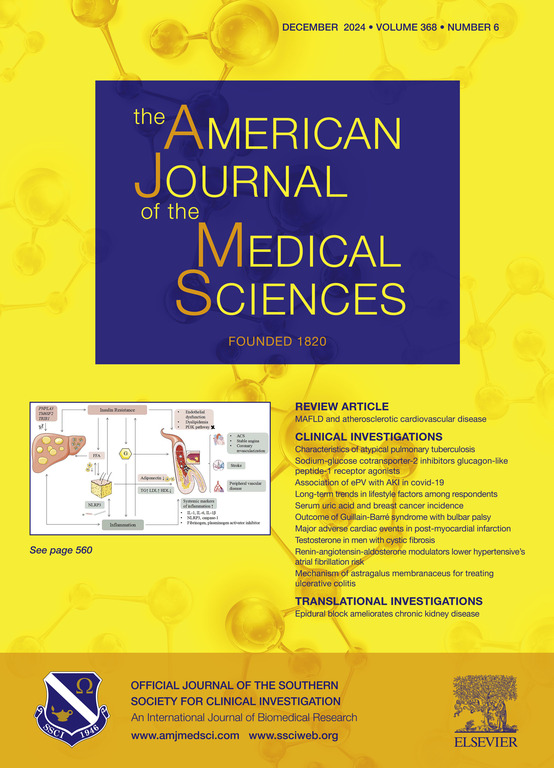Evaluating outcomes of transjugular intrahepatic portosystemic shunt procedure among Native Americans
IF 2.3
4区 医学
Q2 MEDICINE, GENERAL & INTERNAL
引用次数: 0
Abstract
Background
This study aims to explore racial disparities in immediate outcomes of Transjugular Intrahepatic Portosystemic Shunt (TIPS) among Native Americans, a group that have higher prevalence of liver cirrhosis but were the “invisible group” in previous TIPS studies due to their small population size.
Methods
The study identified Native Americans and Caucasians who underwent TIPS in National/Nationwide Inpatient Sample (NIS) database from Q4 2015–2020. Preoperative factors, including demographics, indications for TIPS, comorbidities, etiologies for liver disease, primary payer status, and hospital characteristics, were matched by 1:5 propensity score matching. In-hospital post-TIPS outcomes were then compared between the two cohorts.
Results
There were 6,658 patients who underwent TIPS, where 101 (1.52%) were Native Americans and 4,574 (68.70%) were Caucasians. Native Americans presented as younger, with a lower socioeconomic status, and displayed higher rates of alcohol abuse and related liver diseases. After propensity-score matching, Native Americans had comparable in-hospital post-TIPS outcomes including mortality (8.33% vs 9.09%, p = 1.00), hepatic encephalopathy (18.75% vs 25.84%, p = 0.19), acute kidney injury (28.13% vs 30.62%, p = 0.71), and other adverse events. Native Americans also had similar wait from admission to operation (2.15 ± 0.30 vs 2.87 ± 0.21 days, p = 0.13), hospital length of stay (7.43 ± 0.63 vs 8.62 ± 0.47 days, p = 0.13), and total costs (158,299 ± 14,218.2 vs 169,425 ± 8,600.7 dollars, p = 0.50).
Conclusion
Native Americans had similar immediate outcomes after TIPS compared to their propensity-matched Caucasians. While these results underscore effective healthcare delivery of TIPS to Native Americans, it is imperative to pursue further research for long-term post-procedure outcomes.
评估美国原住民经颈静脉肝内门体分流术的效果。
研究背景该研究旨在探讨经颈静脉肝内门体分流术(TIPS)近期疗效在美国原住民中的种族差异,美国原住民是肝硬化发病率较高的群体,但由于其人口规模较小,在以往的TIPS研究中属于 "隐形群体":该研究在 2015-2020 年第四季度的全国/全美住院病人样本(NIS)数据库中识别了接受 TIPS 的美国原住民和白种人。术前因素包括人口统计学、TIPS适应症、合并症、肝病病因、主要付款人身份和医院特征,通过1:5倾向评分匹配进行匹配。然后比较两组患者住院后的 TIPS 治疗效果:共有 6658 名患者接受了 TIPS,其中 101 名(1.52%)为美国本土人,4574 名(68.70%)为白种人。美国原住民年龄较轻,社会经济地位较低,酗酒和相关肝病的发病率较高。经过倾向分数匹配后,美国原住民住院后的TIPS结果相当,包括死亡率(8.33% vs 9.09%,p=1.00)、肝性脑病(18.75% vs 25.84%,p=0.19)、急性肾损伤(28.13% vs 30.62%,p=0.71)和其他不良事件。美国原住民从入院到手术的等待时间(2.15±0.30 vs 2.87±0.21天,P=0.13)、住院时间(7.43±0.63 vs 8.62±0.47天,P=0.13)和总费用(158299±14218.2 vs 169425±8600.7美元,P=0.50)也相似:结论:与倾向匹配的白种人相比,美国原住民在 TIPS 术后的近期疗效相似。虽然这些结果表明 TIPS 为美国本土居民提供了有效的医疗服务,但对术后长期疗效的进一步研究仍势在必行。
本文章由计算机程序翻译,如有差异,请以英文原文为准。
求助全文
约1分钟内获得全文
求助全文
来源期刊
CiteScore
4.40
自引率
0.00%
发文量
303
审稿时长
1.5 months
期刊介绍:
The American Journal of The Medical Sciences (AJMS), founded in 1820, is the 2nd oldest medical journal in the United States. The AJMS is the official journal of the Southern Society for Clinical Investigation (SSCI). The SSCI is dedicated to the advancement of medical research and the exchange of knowledge, information and ideas. Its members are committed to mentoring future generations of medical investigators and promoting careers in academic medicine. The AJMS publishes, on a monthly basis, peer-reviewed articles in the field of internal medicine and its subspecialties, which include:
Original clinical and basic science investigations
Review articles
Online Images in the Medical Sciences
Special Features Include:
Patient-Centered Focused Reviews
History of Medicine
The Science of Medical Education.

 求助内容:
求助内容: 应助结果提醒方式:
应助结果提醒方式:


